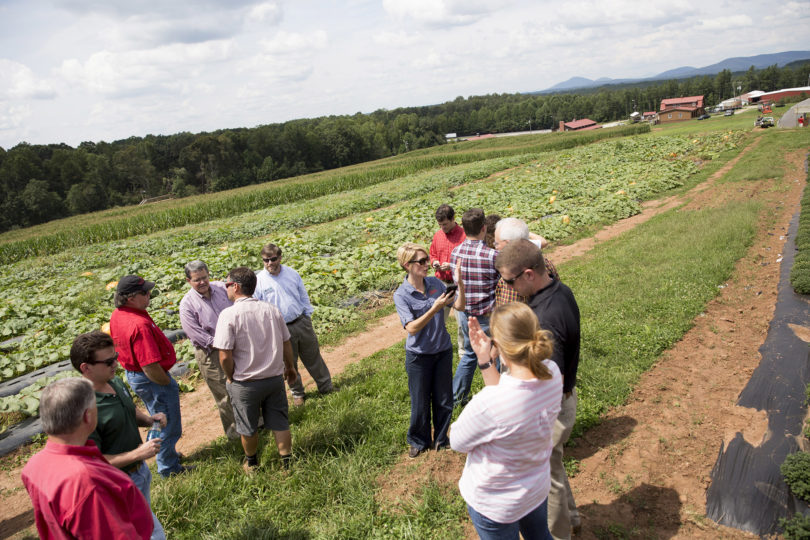From vineyards to vegetable patches to state-of-the-art food processing and food safety operations, agriculture in northeast Georgia is made up of a large and diverse set of enterprises.
UGA President Jere W. Morehead took time Sept. 2 to learn more about the farms, factories and laboratories that contribute to the region and the state’s largest industry during the UGA/State Department of Agriculture’s annual farm tour.
“Candidly, there’s nothing more important to the University of Georgia than its linkage with the agricultural industry,” Morehead said during one stop on the tour. “This tour gives the university a chance to showcase what it does for the agricultural industry and how important that industry is, not only to the state today but to the future of the state.”
This is the third year Morehead has joined Georgia’s Commissioner of Agriculture Gary Black and members of the Georgia General Assembly to visit local farms and food-based businesses around the state. In 2013, the delegation visited farms in northwest Georgia, and in 2014, they visited farms in southwest Georgia. This year the focus was on northeast Georgia.
“This tour is just another example of our efforts to help connect the dots, and we feel that we did that with some great dialogue between the businesses visited and the members of our delegation,” Black said.
Rep. Terry England, chairman of the state House’s Appropriations Committee; Sen. John Wilkinson, chairman of the state Senate’s Agriculture and Consumer Affairs Committee; and J. Scott Angle, dean and director of the UGA College of Agricultural and Environmental Sciences, accompanied Morehead and Black on the tour.
With agritourism, poultry and food manufacturing all playing key roles in northeast Georgia’s agricultural economy, the tour covered six points of interest—from Tiger, in the north Georgia mountains, to Flowery Branch, south of Gainesville.
Starting at Tiger Mountain Vineyards, the delegation learned about one of the fastest growing sectors of Georgia’s agricultural economy and how UGA is contributing to its success through research into grape production, food safety and economic development services.
While in Tiger, the group also visited Hillside Orchards, a top producer of specialty jams, jellies and ciders.
They then traveled to Jaemor Farms in Alto where many of Hillside’s products are sold. Drew Echols, manager at Jaemor Farms, said horticultural research at UGA has helped strengthen the company’s vegetable and fruit production and helped the farm to grow into an agritourism destination that attracts visitors from all over the country.
Morehead also visited the headquarters of the Georgia Poultry Laboratory Network in Gainesville. It is one of several state-of-the-art facilities built to protect the safety of poultry. The state’s poultry farmers produce $5.2 billion worth of chicken and eggs each year, according to the farm gate value report.
The delegation visited King’s Hawaiian Bakery to see how some those eggs are used. The company, which produces sweet buttery rolls and loaves of bread, built a plant in Georgia in 2011 that now bakes half of the nation’s supply of King’s Hawaiian Bread.
“This year’s tour was somewhat different,” Angle said. “We visited food manufacturing facilities, in addition to farms, to show the scope of our college’s contributions to the agricultural economy and to demonstrate the full spectrum of agricultural activities in the state—from farming to food safety to manufacturing value-added products.”
The tour ended at Sonstegard Foods, a third-generation business that provides eggs and a variety of egg products throughout the U.S. At each stop, farm and plant managers shared ways in which UGA has contributed to their success and ways that the university could help in the future.
“Each year our farm tour proves to be an excellent opportunity to showcase the impact UGA has on the lives of everyday Georgians,” Angle said. “It’s also a great chance to learn about the issues and the opportunities facing Georgia’s farmers and how we can help.”





